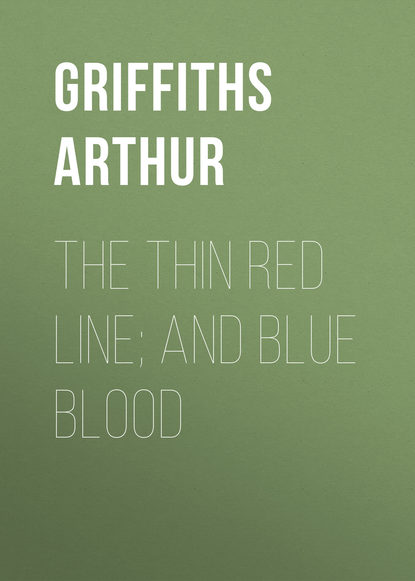По всем вопросам обращайтесь на: info@litportal.ru
(©) 2003-2024.
✖
The Thin Red Line; and Blue Blood
Настройки чтения
Размер шрифта
Высота строк
Поля
"You had better put on your best clothes, general; they are coming to fetch you in state."
"I suppose, on this occasion only, you will wear a hat, Bill?" said Mrs. Wilders.
"I wish you would go down and get ready, my dear; we ought not to keep the gig," said the general, as he himself went below to dress.
"I am not so sure I shall go on shore at all," replied his wife.
"No!" cried Lord Lydstone. "Throw the general over, and stay on board with me."
"That would be too great penance," said Mrs. Wilders, as she moved towards the companion-ladder. "I've had enough of your lordship for one day."
Lydstone got up, looking rather vexed, and followed her across the deck. When he was quite close to her side he whispered with suppressed but manifest feeling—
"Why do you torture me so? Sometimes I think you care for me; sometimes that you hate and detest me. What am I think?"
"What you choose," she answered, in a low, quick voice, evidently much displeased. "I have given you no right to speak to me in this way. Let me pass, or I shall appeal to my lawful protector!"
Presently Mrs. Wilders reappeared, dressed to perfection in some cool light fabric, serene and smiling to everyone but Lord Lydstone. She was especially gracious to young Mr. Wilders, who had come off in the Governor's gig, and had been cordially welcomed by his brother.
"Another cousin," said the general, introducing him. He was now in uniform—the general—in uniform to suit his own fancy rather than the regulations. The only orthodox articles of apparel were his twisted general's scimitar and a forage-cap with a broad gold band. His coat and waistcoat were of white cloth; he had a wide crimson sash round his waist, and his lower limbs were encased in hunting-breeches and long boots. "Anastasius, one of the Royal Picts."
"All soldiers, you Wilders, all—except one." This was specially intended to annoy Lydstone. "The future head of the house is kept in cotton-wool; he is too precious, I suppose, to be risked."
"It is not my fault," began Lydstone. It was a sore point with him that he had not been permitted—in deference to his mother's fond protests—to enter the army.
"Are you not coming with us, Lydstone?" said his young brother, greatly disappointed. "I did want to show you our mess."
"I know Gibraltar by heart, and I have letters to write. I hope you will enjoy yourself, Countess," he added, sarcastically, as they went down the side.
"There's no fear of that, now we have left you behind," replied Mrs. Wilders, sharply.
"Why can't you and Lydstone keep better friends?" said General Wilders, a little shocked at this remark.
"It's his fault, not mine, and that's enough about it," replied Mrs. Wilders, rather petulantly. "Did you ever quarrel with your brother," she went on to Anastasius, "when you were boys?"
"I would not have dared. Not that I wanted to: we three brothers were always the best of friends."
"You are an affectionate family, Mr. Wilders; I have long been convinced of that," said Mrs. Wilders, who could not leave the subject alone.
But now the gig, impelled by six stout oarsmen, was nearing the Waterport Guard, and was already under the shadow of the frowning batteries of the Devil's Tongue. High above them rose the sheer straight wall of the rock, bristling with frowning fortifications, line above line, and countless embrasures armed with heavy artillery.
The wharf itself was crowded with the usual motley polyglot gathering—sailors of all nations, soldiers of the garrison, Spanish peasants from the neighbouring villages, native scorpions, policemen, and inspectors of strangers.
"How amusing! How interesting! It's like a scene in a play!" cried Mrs. Wilders, as she stepped ashore.
Escorted by her husband and cousin, they pushed their way through the crowd towards the Waterport gateway, and under it into the main ditch. As they approached there was a cry of "Guard, turn out!" and the Waterport Guard, under its officer, fell in with open ranks to give the general a salute. General Wilders acknowledged the compliment, and, while he stood there with two fingers to his hat, Sergeant McKay advanced and reported himself.
"Your orderly, sir."
"Eh! what?" said the general, a little surprised. "My orderly! Very considerate of Sir Thomas," he went on. "One of the Royal Picts, too, and a guard from the same regiment! Most attentive, I'm sure!"
The general went up at once to the front rank of the guard, and proceeded to inspect the men carefully. With his own hands he altered the hang of the knapsacks and the position of the belts; he measured in the regular way, with two fingers, the length of the pouch below the elbow, grumbling to himself as he went along.
"So you use harness-blacking for your pouches. I don't approve of that. And your pipe-clay; it's got too blue a tinge."
While he lingered thus fondly over the trifling details that, to his mind, summed up the whole duty of a general officer, his wife's voice was heard impatiently calling him to her side.
"Come, general, don't be all day! How can you waste time over such nonsense!"
"My dear," said her husband, gravely, as he rejoined her, "this regiment is to form part of my brigade"—McKay pricked up his ears—"it is the first time I have seen any of it. You must allow me—"
"I am going on into the town; inspecting guards doesn't amuse me," and the general discreetly abandoned his professional duties and walked on by her side.
The guard was dismissed by its commander; the men "lodged arms" and went back to the guard-room. Only Sergeant Hyde remained outside, watching the retreating figures of the Wilders' party.
"I should have known her voice again amongst a thousand," said the old sergeant, shaking his head; "and from the glimpse I caught of her she seemed but little changed. I wonder whether she saw me. Not that she would have recognised me; I am not what I was. No one here has made me out, although a dozen years ago I was well known all over the Rock. Besides, how could she see me? I was on the other flank, and, fortunately, she left the general to inspect us by himself. Poor man! I had rather be a sergeant—a private even—than stand in that general's shoes."
CHAPTER VII.
AN OLD ACQUAINTANCE
The Wilders' party, after leaving the Waterport, passed through the Casemate Barrack Square and entered Waterport Street, the chief thoroughfare of the town. It was a narrow, unpretending street, very foreign in aspect; the houses tall and overhanging with balconies filled with flowers; the lattice-shutters gaily painted, having outside blinds of brilliantly striped stuffs.
The shop fronts were small, the wares common-place; the best show was at the drapers, where they sold British calicoes and piece-goods in flaunting colours, calculated to suit the local taste.
The street, both pavement and roadway, was crowded. In the former were long strings of pack-horses bringing in straw and charcoal from Spain; small stout donkeys laden with water-barrels; officers, some in undress uniform, many more in plain clothes, riding long-tailed barbs; occasionally a commissariat wagon drawn by a pair of sleek mules, or a high-hooded calêche, with its driver seated on the shafts, cut through the throng. Detachments of troops, too, marched by: recruits returning from drill upon the North Front, armed parties, guards coming off duty, and others going on fatigue—all these cleared the street before them. On the pavement the crowd was as diverse as might be expected, from the mixed population. Stately Moors rubbed elbows with stalwart British soldiers; Barbary Jews, dejected in mien, but with shrewd, cunning eyes, chaffered with the itinerant vendors of freshly caught sardines, or the newly-picked fruit of the prickly pear. Now and again, quite out of keeping with her surroundings, a rosy-cheeked British nursemaid passed by escorting her charges—the blue-eyed, flaxen-haired children of the dominant race.
General Wilders walked along with head erect, returning punctiliously the innumerable salutes he received, quite happy, and in his element in this essentially military post and stronghold. Mrs. Wilders seemed also to enjoy the busy, animated scene: it was all so new to her, so different from anything she had expected, as she was at great pains to explain. The sight of this foreign town held by British bayonets pleased her, she said; she was proud to think that she was now an Englishwoman.
"It is your first visit to Gibraltar, then?" said young Mr. Wilders, anxious to be civil.
"Oh, yes!" she replied; "that is why I am so interested—so amused by all I see."
Was this absolutely true? She seemed, as she led the way across the casemate square and up Waterport Street, to know the road without guidance, and once or twice a passer-by paused to look at her. Were they only paying tribute to her radiant beauty, or was her's not altogether an unfamiliar face?
It was evident that there were those at Gibraltar who knew her, or mistook her for some one else.
As the party reached the Commercial Square, and the main guard, like that at Waterport, turned out to do honour to the general, a man pushed forward from a little group that stood respectfully behind the party, and whispered hoarsely in Mrs. Wilders's ear—
"Dios mio! Cypriana! Es usted?" (Gracious Heavens! Cyprienne! Is it you?)
Mrs. Wilders stopped and looked round. At that moment, too, young Wilders turned angrily on the man—a black-muzzled, Spanish-looking fellow, dressed in a suit of coarse brown cloth, short jacket, knee-breeches, and leather gaiters—the dress, in fact, of a well-to-do Spanish peasant—and said, sharply, "How dare you speak to this lady? What did he say to you, Mrs. Wilders—anything rude?"
Mrs. Wilders had recovered herself sufficiently to reply in an unconcerned tone—
"I did not understand his jargon; but it does not matter in the least; don't make any fuss, I beg."
The incident had been unobserved by any but these two, and it must have been speedily forgotten by young Wilders, for he said nothing more. But Mrs. Wilders, as they passed on, and for the rest of their walk to the Convent, as the Governor's residence is still styled, looked anxiously behind to see if the man who had claimed acquaintance with her was still in sight.








